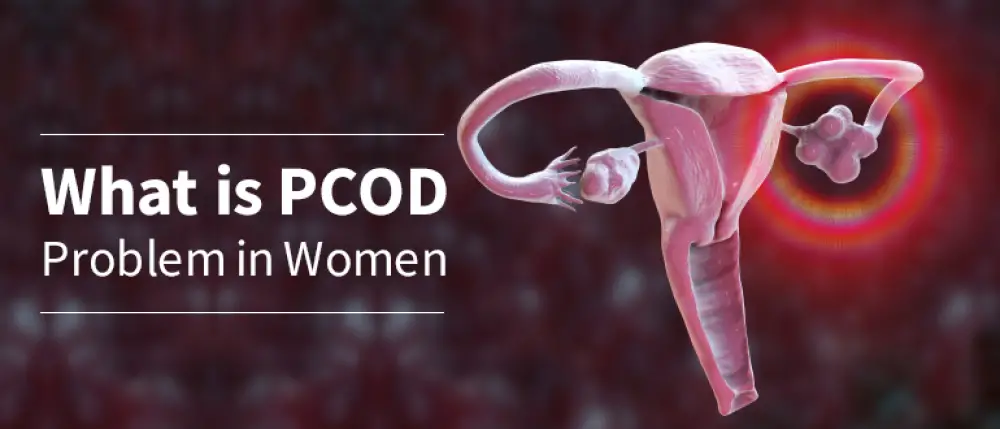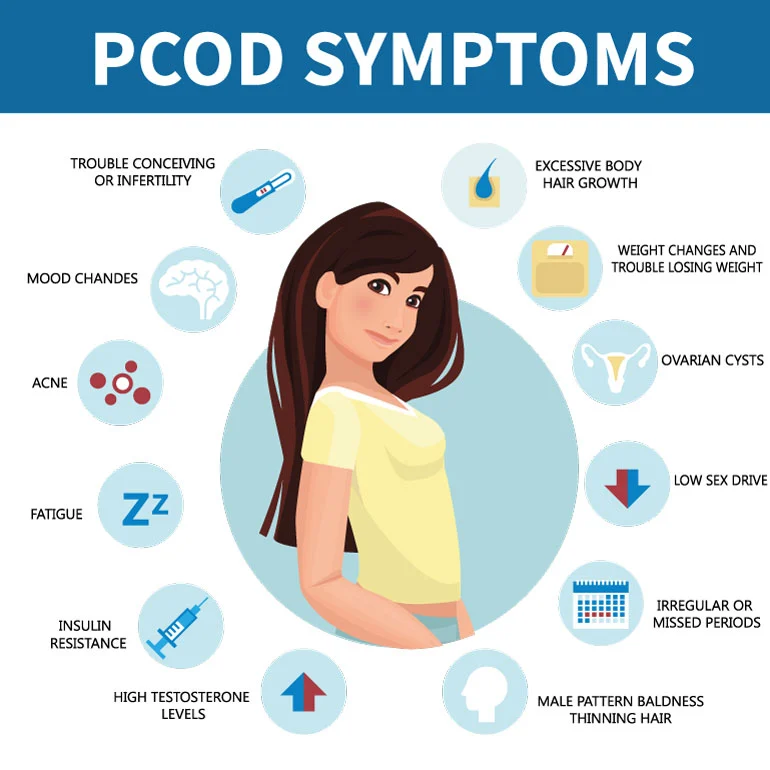Subscribe to get weekly insights
Always stay up to date with our newest articles sent direct to your inbox
Published on 7 Apr, 2023
Updated on 10 Aug, 2025
275663 Views
4 min Read

Written by Care Health Insurance
favorite10Likes
Given the detrimental work-life culture, India’s reproductive age group is struggling with infertility issues more than ever today. Studies reveal that India’s Total Fertility Rate is below 2.1 children per woman, while the General Fertility Rate (GFR) has dropped by 20% over the past decade. GFR is the number of children born annually per 1,000 women in the reproductive age bracket (15-49 years) annually.
Among the reasons behind dropped fertility, a rising health concern is PCOD. Affecting more than 10% of females worldwide, one in five women experience the PCOD problem after marriage or before it.
This article will elaborate on the causes, symptoms, and treatment of PCOD problems among women.
Polycystic Ovarian Disease or PCOD is a condition of hormonal imbalance that disrupts the normal fertility cycle in women. It occurs due to an abnormal situation when one of the ovaries starts overproducing the immature eggs that get accumulated in the ovary.
Ovaries are the female reproductive organs responsible for the pregnancy. They produce hormones like progesterone and estrogen that control the ovulation process that leads to pregnancy; and the relaxin hormone that stretches the body's muscles during pregnancy. Besides, the ovaries are essential in maintaining women's menstrual cycle. Thus, PCOD is a condition that affects a woman’s menstrual cycle and overall health condition.
While PCOD and PCOS sound similar, they are slightly different health conditions. While both conditions are caused due to hormonal balance gets disturbed and ovarian overproduction, there is a difference in the consequences of the same.
PCOS, or Polycystic Ovarian Syndrome, is when ovaries overproduce male hormones (androgens), leading to excess testosterone in females that do not combine with estrogen.
Here are the critical differences between PCOD & PCOS:
| Difference | PCOS | PCOD |
|---|---|---|
| Definition | PCOS is a hormonal imbalance due to the overproduction of androgens in ovaries. | PCOD is a hormonal imbalance due to overproduction of immature eggs in ovaries. |
| Impact on Fertility | More critical; Pregnancy may occur with risk of miscarriage, premature birth. | Lesser impact on fertility; Pregnancy is possible though it gets delayed. |
| Complications | May result in health issues like diabetes, heart ailments, hypertension, etc. | PCOD doesn’t cause any severe health complications. |
| Treatment | Can be treated only with hormonal medication. | It can be easily treated with lifestyle changes. |
| Prevalence in India | Around 9.13% of menstruating Indian women suffers from PCOS.* | Around 22.5% of menstruating Indian women are currently suffering from PCOD.* |
*As per the recent study by UNICEF.
Although gynecologists have not detected any clear-cut causes for this disease so far, some evident factors are responsible for the PCOD problem in females, include:

The onset of PCOD often begins during the first menstrual period. However, sometimes you may detect PCOD symptoms a few months post your first period.
The symptoms of PCOS may vary. Experts suggest that you should get a diagnosis for PCOD if you have at least two of the following symptoms:
Yes, pregnancy is possible even when dealing with a PCOD condition. However, the pregnancy might get delayed due to abnormalities in the ovulation process.
Besides, with a PCOD condition, pregnant women are at higher risk of facing the following complications:
Hence, it is crucial to get timely treatment for PCOD symptoms before marriage and/or pregnancy.
>> Also Read: Waiting Period in Maternity Insurance
There is no need to worry if you’re diagnosed with PCOD. Treatment for PCOD is possible and easier to undertae than you think.
If you follow such a Satvic lifestyle, you may not even require any medical treatment for PCOD. The good news is that PCOD can be treated without medications, unlike the PCOS problem, which requires prolonged hormonal medications and treatment.
With an improved lifestyle and the adoption of healthy habits, you can easily overcome PCOD and expect a smooth pregnancy ahead.
Additionally, you can ensure peaceful and happy motherhood with Care Health Insurance Policy. Our maternity health insurance plan helps expecting couples bear pregnancy-related expenses and newborn childcare. It also covers the daycare expenses of both the mother and child, which will help you live every moment of motherhood stress-free. With no financial stress, you can lead a healthy life and experience a joyful pregnancy phase.
Disclaimer: Verifying the policy details and coverage with the official policy documents is essential. Also, kindly consult a professional medical expert to verify the details of health concerns.
*The Insured Person would receive a flat 100% of the base Sum Insured on a cumulative basis irrespective of claim for unlimited period . At the time of Policy renewal if the Policyholder chooses not to renew this Optional Benefit, then the Infinity Bonus under the expiring Policy shall be forfeited.
Thyroid : मामूली नहीं हैं महिलाओं में थायराइड होना, जानें इसके लक्षण और घरेलू उपचार Vipul Tiwary in Diseases
शुगर कंट्रोल कैसे करे? जानें, डायबिटीज में क्या खाना चाहिए Vipul Tiwary in Health & Wellness
हाई ब्लड प्रेशर को तुरंत कंट्रोल कैसे करें? देखें इसके उपाय Vipul Tiwary in Diseases
पैरों में दर्द किस कमी से होता है? जानें, इसके घरेलू इलाज Vipul Tiwary in Health Insurance Articles
Safe Pregnancy Workouts For Every Trimester Sambriddhi Sharma in Fitness
प्रेगनेंसी ब्लड टेस्ट कब करना चाहिए? देखें, प्रेगनेंसी ब्लड टेस्ट नाम Vipul Tiwary in Maternity
12 Symptoms of Pregnancy - How Early Do the Symptoms Start? Anjali Sharma in Maternity
How to Avoid Maternity Insurance Claim Rejection? Anjali Sharma in Maternity
Always stay up to date with our newest articles sent direct to your inbox
Loading...